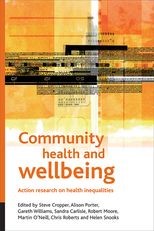 Community health and wellbeing: Action research on health inequalities
Community health and wellbeing: Action research on health inequalities
Steve Cropper (ed.)
et al.
Published online:
22 March 2012
Published in print:
22 October 2007
Online ISBN:
9781447301936
Print ISBN:
9781861348180
Contents
-
-
-
-
-
Introduction Introduction
-
Public policy: distinctions and debates Public policy: distinctions and debates
-
New Labour, public policy and wicked problems New Labour, public policy and wicked problems
-
Policy design, complexities and policy stress Policy design, complexities and policy stress
-
Policy implementation: governance and organisation of the policy system Policy implementation: governance and organisation of the policy system
-
Policy learning Policy learning
-
Conclusion Conclusion
-
Notes Notes
-
References References
-
-
-
-
-
-
-
-
-
-
Chapter
Two ‘Policy experiments’: policy making, implementation and learning
Get access
Pages
23–47
-
Published:October 2007
Cite
Cropper, Steve, and Mark Goodwin, '‘Policy experiments’: policy making, implementation and learning', in Steve Cropper, Alison Porter, and Gareth Williams (eds), Community health and wellbeing: Action research on health inequalities (Bristol , 2007; online edn, Policy Press Scholarship Online, 22 Mar. 2012), https://doi.org/10.1332/policypress/9781861348180.003.0002, accessed 8 May 2025.
Abstract
This chapter considers the nature of public policy and the ways in which health policy is made in Great Britain. It examines attempts to improve policy making and its effectiveness, particularly against a challenging agenda of revitalisation of welfare and public service. The chapter also evaluates how the Sustainable Health Action Research Programme (SHARP) could be established as both an action and a research programme against the emergence of health and health inequalities as public policy concerns. It contends that policy requires legitimacy other than governmental authority if it is to be carried through.
Keywords:
public policy, health policy, Great Britain, welfare, public service, SHARP, health inequalities, legitimacy
Subject
Public Health
You do not currently have access to this chapter.
Sign in
Personal account
- Sign in with email/username & password
- Get email alerts
- Save searches
- Purchase content
- Activate your purchase/trial code
- Add your ORCID iD
Purchase
Our books are available by subscription or purchase to libraries and institutions.
Purchasing informationMetrics
View Metrics
Metrics
Total Views
8
6
Pageviews
2
PDF Downloads
Since 11/1/2022
| Month: | Total Views: |
|---|---|
| November 2022 | 5 |
| April 2024 | 3 |
Citations
Altmetrics
More from Oxford Academic


Get help with access
Institutional access
Access to content on Oxford Academic is often provided through institutional subscriptions and purchases. If you are a member of an institution with an active account, you may be able to access content in one of the following ways:
IP based access
Typically, access is provided across an institutional network to a range of IP addresses. This authentication occurs automatically, and it is not possible to sign out of an IP authenticated account.
Sign in through your institution
Choose this option to get remote access when outside your institution. Shibboleth/Open Athens technology is used to provide single sign-on between your institution’s website and Oxford Academic.
If your institution is not listed or you cannot sign in to your institution’s website, please contact your librarian or administrator.
Sign in with a library card
Enter your library card number to sign in. If you cannot sign in, please contact your librarian.
Society Members
Society member access to a journal is achieved in one of the following ways:
Sign in through society site
Many societies offer single sign-on between the society website and Oxford Academic. If you see ‘Sign in through society site’ in the sign in pane within a journal:
If you do not have a society account or have forgotten your username or password, please contact your society.
Sign in using a personal account
Some societies use Oxford Academic personal accounts to provide access to their members. See below.
Personal account
A personal account can be used to get email alerts, save searches, purchase content, and activate subscriptions.
Some societies use Oxford Academic personal accounts to provide access to their members.
Viewing your signed in accounts
Click the account icon in the top right to:
Signed in but can't access content
Oxford Academic is home to a wide variety of products. The institutional subscription may not cover the content that you are trying to access. If you believe you should have access to that content, please contact your librarian.
Institutional account management
For librarians and administrators, your personal account also provides access to institutional account management. Here you will find options to view and activate subscriptions, manage institutional settings and access options, access usage statistics, and more.